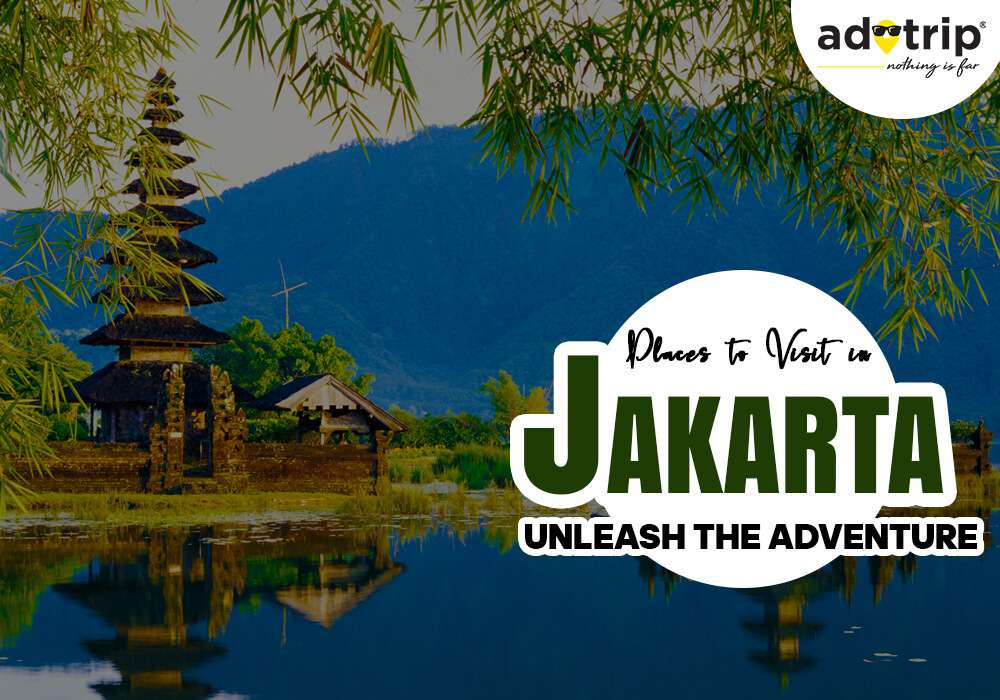
Last Updated At: 13-May-2024
Indonesian Culture And Traditions
The Culture of Indonesia is a captivating amalgamation of traditions, beliefs, and artistic expressions that resonate across its diverse archipelago. Encompassing a plethora of ethnicities and languages, Indonesia stands as a living testament to unity in diversity. At the heart of this cultural tapestry lies the intricate threads of Indonesian cuisine and the exuberant celebrations of its cultural festivals. Together, these elements create a vibrant and dynamic cultural landscape that reflects the nation's rich history, values, and shared identity.
Indonesian cuisine, renowned worldwide for its bold flavours and diverse influences, embodies the country's culinary heritage. From the aromatic rendang of Sumatra to the fragrant nasi goreng enjoyed throughout the nation, Indonesian cuisine is a harmonious fusion of indigenous ingredients and historical trade interactions. Spices and herbs like lemongrass, turmeric, and chilli peppers infuse dishes with layers of complexity, reflecting the interplay of cultures that have shaped the archipelago. Indonesian cuisine isn't just sustenance; it's a celebration of the land's bounty and a way to forge connections between people, fostering a sense of belonging.
Indonesian Culture And Traditions
Cultural festivals in Indonesia are vibrant reflections of the nation's soul, showcasing its diverse ethnic traditions and shared celebrations. Festivals like Nyepi in Bali, marked by a day of silence and self-reflection, and the lively Jakarta International Java Jazz Festival resonate with the nation's spirituality and artistic expression values. These festivals are bridges that connect generations, enabling the passing down of traditions while embracing contemporary creativity. Through these celebrations, Indonesia showcases its profound respect for Culture, unity, and the shared experiences that bind its people together in harmony.
- Melodic Harmonies | Traditional Music in Indonesia
- A Culinary Voyage | Discovering Indonesian Gastronomy
- Celebrating Culture | Vibrant Festivals of Indonesia
- Journeys of Faith | Spirituality and Beliefs in Indonesia
- Architectural Marvels | The Diversity of Indonesia's Architecture
- Written Tales and Cinematic Visions | Literature and Films from Indonesia
- Expressive Artistry | Crafts and Art in Indonesian Culture
- Elegant Movements | Dance Forms of Indonesia
- Legacy Echoes | Indonesia's Cultural Heritage
- Threads of Time | Traditional Attire in Indonesian Culture
1. Melodic Harmonies | Traditional Music in Indonesia
Indonesia's traditional music is a symphony that resonates with the nation's diverse cultural tapestry. Traditional music is an integral part of Indonesia's identity, from the enchanting sounds of the gamelan orchestra to the soulful melodies of the angklung. The gamelan, with its array of metallophones and gongs, embodies the harmonious blend of spiritual and artistic expressions. On the other hand, the angklung is a bamboo instrument that is not only a musical delight but also a symbol of unity, often played in groups. Traditional music accompanies rituals, ceremonies, and celebrations, creating an immersive experience that binds communities together. It's a testament to the nation's artistic depth and reverence for the past while embracing the present.
2. A Culinary Voyage | Discovering Indonesian Gastronomy
Indonesian cuisine is a sensory journey that reflects the nation's history, geography, and cultural diversity. From the iconic rendang to the beloved nasi goreng, each dish is a masterpiece that tells a story. Using aromatic spices such as coriander, turmeric, and lemongrass creates a symphony of flavours that dance on the palate. Indonesian cuisine isn't just about nourishment; it's a celebration of togetherness and hospitality. The act of sharing a meal symbolises unity and fosters connections. The culinary traditions are preserved through generations, with recipes passed down like treasured heirlooms. Indonesian gastronomy is a tribute to the nation's agricultural heritage and its ability to transform humble ingredients into culinary wonders that delight locals and visitors alike.
3. Celebrating Culture | Vibrant Festivals of Indonesia
Indonesia's cultural landscape is illuminated by a kaleidoscope of festivals that reflect the nation's diverse traditions and shared celebrations. Festivals like Bali's Nyepi or the Day of Silence offer a glimpse into the spirituality and introspection that shape the nation's ethos. The exuberant Jakarta International Java Jazz Festival celebrates music and artistic expression, embodying Indonesia's contemporary creativity. Festivals are more than mere events; they are threads that weave communities together, fostering unity and creating lasting memories. The traditional dances, music performances, and colourful processions are windows into Indonesia's soul, showcasing its reverence for Culture, art, and the shared human experience. highlighting the significance of festival in Indonesia.
4. Journeys of Faith | Spirituality and Beliefs in Indonesia
Indonesia's spiritual landscape is a mosaic of faiths that coexist harmoniously, reflecting the nation's commitment to diversity and tolerance. The cultural and religious heritage is embedded in the intricate designs of mosques, temples, and churches. Islam, as the predominant religion, influences daily life and shapes societal values. However, Indonesia's unique blend of Hindu, Buddhist, Christian, and indigenous beliefs creates a spiritual fabric as diverse as its people. Rituals, ceremonies, and prayers are pathways to connection, forging bonds within communities and serving as reminders of shared values. The spirituality of Indonesia is a reflection of its people's deep-rooted reverence for tradition and their embrace of individual and collective journeys of faith.
Also Read: things to do in indonesia
5. Architectural Marvels | The Diversity of Indonesia's Architecture
Indonesia's architectural landscape is a treasure trove of diverse styles, showcasing the nation's rich history and cultural influences. Each structure narrates a chapter of Indonesia's past, from the majestic Borobudur temple to the intricate Minangkabau vernacular architecture. The vernacular designs often utilise natural materials, responding to the local climate and customs. The Dutch colonial buildings remind Indonesia's colonial history, while contemporary architecture in cities like Jakarta reflects the nation's modern aspirations. The architectural diversity mirrors the unity in Indonesia's multicultural society, embodying a sense of place and a shared appreciation for heritage and innovation.
6. Written Tales and Cinematic Visions | Literature and Films from Indonesia
Indonesian literature and cinema are windows into the nation's imagination, history, and aspirations. Literary works like "This Earth of Mankind" by Pramoedya Ananta Toer delve into the nation's colonial past, while contemporary authors like Eka Kurniawan explore themes of mythology and urbanisation. With renowned directors like Riri Riza and Garin Nugroho, Indonesian cinema captures the nuances of daily life, social issues, and cultural reflections. Literature and films entertain and inspire conversations, provoke thoughts, and offer glimpses into the Indonesian experience. They reflect the nation's storytelling traditions and transmit knowledge, values, and emotions across generations.
Also Read: places to visit in indonesia
7. Expressive Artistry | Crafts and Art in Indonesian Culture
Indonesian art and crafts are tangible expressions of creativity and cultural identity. From intricate batik textiles to mesmerising wayang kulit shadow puppets, each piece encapsulates the artisan's skill and the nation's values. With its intricate patterns and vibrant colours, Batik reflects the beauty of Indonesia's natural landscapes and traditions. Wayang kulit performances are not just entertainment; they convey stories, myths, and morals passed down for centuries. These artistic expressions testify to Indonesia's commitment to preserving and celebrating its cultural heritage, breathing life into traditions that inspire awe and appreciation.
8. Elegant Movements | Dance Forms of Indonesia
Indonesian dance forms manifest grace, storytelling, and cultural expression. The graceful movements of the legong dance tell tales of love and mythical creatures, while the robust barong dance symbolises the eternal struggle between good and evil. The traditional dances are often accompanied by gamelan music, creating a multisensory experience that transports audiences to different realms. Dance forms are not just performances; they are an embodiment of Indonesia's narrative traditions and a celebration of its artistic prowess. These dances mirror the nation's cultural depth, offering a glimpse into the stories and values that continue to resonate with modern audiences.
9. Legacy Echoes | Indonesia's Cultural Heritage
Indonesia's cultural heritage is an echo of the past that resonates through time, embodying the wisdom of its ancestors and the spirit of its people. Sites like Borobudur and Prambanan are monumental witnesses to the nation's history and architectural brilliance. Traditional ceremonies like the Toraja funeral rituals reflect the enduring connection to the land and ancestors. The cultural heritage of Indonesia is more than artefacts; it's a living legacy that influences daily life, shapes values, and connects Indonesians to their roots. It's a reminder that the nation's history is a source of inspiration, resilience, and unity.
Also Read: facts about indonesia
10. Threads of Time | Traditional Attire in Indonesian Culture
Traditional attire in Indonesia is a tapestry of history, craftsmanship, and cultural significance. The intricate weaving techniques of songket textiles and the vibrant patterns of kebaya attire are a testament to Indonesia's diverse ethnic groups and unique expressions. Traditional clothing isn't merely a garment but a visual story connecting wearers to their heritage and rituals. From the Javanese sarong to the Balinese using headcloth, each piece is a thread that weaves together past and present. Traditional attire reflects Indonesia's commitment to preserving its cultural identity and serves as a canvas that illustrates the nation's diversity, values and shared history.
The Culture of Indonesia is a vibrant and multifaceted tapestry that weaves together diverse traditions, artistic expressions, and a deep sense of identity. From the enchanting melodies of traditional music to the tantalising flavours of its cuisine, Indonesia's Culture reflects the nation's rich history, values, and the harmonious coexistence of its people. Celebrating Culture through festivals that embrace spirituality, artistic endeavours, and communal unity showcases Indonesia's commitment to preserving its heritage while embracing contemporary creativity. Indonesia's cultural heritage, embodied in its monuments, rituals, and everyday practices, serves as a reminder of its ancestors' roots and wisdom. Threads of tradition, woven through time, reflect the nation's commitment to preserving its identity in a rapidly changing world. In essence, the Culture of Indonesia is an intricate mosaic that encapsulates the nation's values, aspirations, and the interconnectedness of its people. So are you ready to immerse yourself in the Culture of Indonesia, then plan your journey with Adotrip, and enjoy a smooth travel experience?
With us, nothing is far!
Book Switzerland Tour Packages
Frequently Asked Questions about the Culture of Indonesia
Q1. How diverse is Indonesian Culture across its 17,000+ islands?
A1. Indonesian Culture is diverse across its 17,000+ islands:
- Varies by ethnic groups and regions
- Reflects unique traditions, languages, and arts
- It encompasses religious practices and local customs
Q2. What are the main religions practised in Indonesia?
A2. The main religions practised in Indonesia:
- Islam is the majority religion
- It also includes Christianity, Hinduism, Buddhism
- Embraces indigenous beliefs and traditions
Q3. How important is rice as a dietary staple?
A3. Rice is crucial as a dietary staple in Indonesia:
- Staple food across the nation
- Often accompanied by side dishes
- Symbolises sustenance and cultural significance
Q4. What traditional dance and musical forms like gamelan persist?
A4. Traditional dance and musical forms like gamelan persist in Indonesia:
- Gamelan orchestras with metallophones
- Diverse dance forms like legong, barong
- Passed down through generations, it reflect cultural identity
Q5. How popular is shadow puppet theatre wayang kulit?
A5. Shadow puppet theatre wayang kulit is popular in Indonesia:
- Ancient Javanese art form
- Mythological stories and moral lessons
- Preserved and performed at cultural events
Q6. What is Indonesia's national motto and philosophy?
A6. Indonesia's national motto and philosophy:
- "Bhinneka Tunggal Ika"
- Unity in Diversity
- Embraces cultural and religious harmony
Q7. How strong is the tradition of batik textiles?
A7. The tradition of batik textiles is strong in Indonesia:
- The ancient art of wax-resist dyeing
- Various regions with distinct patterns
- Cultural significance in ceremonies, clothing
Q8. What religions, like Hinduism and Buddhism, shaped ancient kingdoms?
A8. Religions like Hinduism and Buddhism shaped ancient kingdoms in Indonesia:
- Influenced cultural and architectural development
- Seen in temples like Borobudur, Prambanan
- Left enduring marks on artistic and spiritual aspects
Q9. What island is the spiritual home of Balinese Culture?
A9. The island that is the spiritual home of Balinese Culture:
- Bali
- Rich cultural traditions and rituals
- A strong influence on arts, dance, and religion
Q10. How tied to identity is Indonesian cuisine?
A10. Indonesian cuisine is closely tied to identity:
- Reflects diverse cultures and regions
- Symbolises heritage and social gatherings
- Showcases local ingredients and cooking methods
--- Published By Adotrip
Latest Blogs

17 Best Places for 2 Days Trip from Delhi

Top 10 Hill Stations Near Bangalore for an Unforgettable Get...

Top 10 Hill Stations Near Chennai For a Perfect Getaway

10 Best Hill Station Getaways Near Gurgaon for Peace Seekers

10 Astonishing Underwater Temples of India You Must Visit in...
Speak to our experts
Popular Flights
Indore to Nagpur Flights
Kochi to Pune Flights
Nagpur to Jaipur Flights
Hyderabad to Chennai Flights
Jammu to Srinagar Flights
Jaipur to Ahmedabad Flights
Dehra Dun to Indore Flights
Pune to Lucknow Flights
Udaipur to Jammu Flights
Bhubaneswar to Goa Flights






 Dubai
Dubai Malaysia
Malaysia USA
USA






